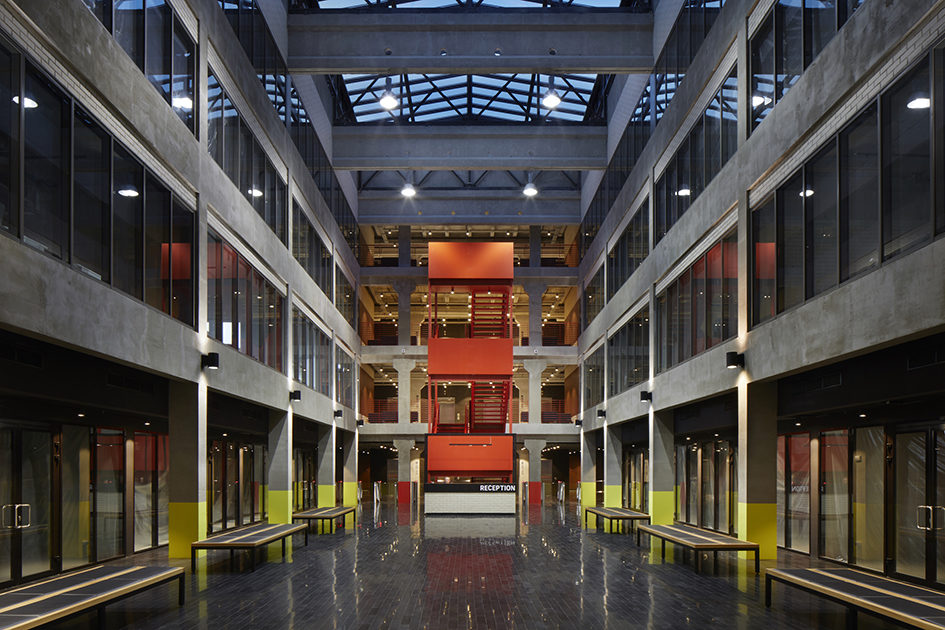INSIDE World Festival of Interiors, the leading global interior design and architecture awards programme, has announced the shortlist of 77 projects that will compete to be crowned World Interior of the Year 2018.
Projects from across the globe were entered across nine diverse categories, ranging from health and educational buildings to hotels, bars and restaurants, and residential homes. Hosted alongside the World Architecture Festival (WAF), the event attracts more than 2,000 attendees each year for its three days of talks, awards, exhibitions and fringe events.
Paul Finch, Programme Director of INSIDE World Festival of Interiors commented on this year’s shortlist: “Once again our finalist judges will have a wealth of good interiors to consider, and it will be a treat to listen to the designers present their ideas live to our international juries and delegates. This was a pleasing entry in terms both of geographical spread and range of project types.”
Shortlisted designers reflect the global reach of the awards and include WATG and Wimberly Interiors (Turkey), Genius Loci (Indonesia) BIG – Bjarke Ingels Group (Denmark) and Studio Chris Fox (Australia), Shanwei Weng (China), Beijing.
Fenghemuchen Space Design (China) and Department of Architecture Co (Thailand) were amongst those with the most shortlisted projects. The largest number of projects within the shortlist are based in China (20%), and mainly within the bars and restaurant category, followed by Australia (12%) and Taiwan (9%).
All nominees will present their projects to distinguished international juries that include Nigel Coates, and Lyndon Neri, Neri & Hu, during the Festival to compete for one of the nine INSIDE category awards. Open to all festival attendees, the presentations are followed by a live exchange between the designers and jurors. The overall winner of the ‘World Interior of the Year’ will be announced at an exclusive gala dinner on 30 November at the Beurs van Berlage.
Highlights from this year’s shortlist include:
- Danish practice BIG-Bjarke Ingels Group has been shortlisted in Civic, Culture and Transport category for its ‘Lego House’ project in the heart of Billund. A life-size re-creation of the traditional lego brick house, the 23-metre-tall ‘Lego House’ is an immersive experience centre. Twenty-one overlapping blocks are placed like individual buildings, which frames a 2,000 m2 LEGO urban square that is illuminated through the cracks and gaps between the volumes. The central square welcomes locals and visitors to further amenities such as a café, restaurant, LEGO store and conference facilities.
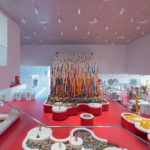
Lego House by Bjarke Ingels Group
- Shortlisted for one of the best creative re-use projects is Nocenco Café by Vietnamese practice VTN architects (Vo Trong Nghia Architects). This renovation project includes a café on the rooftop of a 7-floor middle-rise concrete building which has been transformed into a local landmark in the city centre of Vinh City, north of Vietnam. Unlike other post-war buildings in the local area, bamboo has been used extensively throughout the café and to the exterior of the existing building due to its accessibility, weight and durability as a building material.
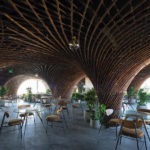
Nocenco cafe by Vo Trong Nghia Architects
- Australian practice, Studio Chris Fox, has been shortlisted in the Display category for their innovative ‘Interloop’ design, which sits above the main entrance of Wynard station, Sydney. Made from re-used 1930s OTIS escalator treads, the Interloop measures more than 50 metres in length, weighs more than five tonnes, and weaves in 244 wooden treads and four combs from the original escalators.
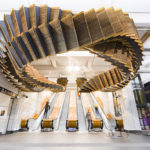
Interloop by Studio Chris Fox
- In another highlight from the Civic, Culture and Transport category WATG and Wimberly Interiors (Turkey) have been shortlisted for their Belmond Venice Simplon-Orient-Express project which features Art Deco interiors. Wimberly Interiors renovated three ultra-luxurious private suites aboard the train. Drawing inspiration from the heritage and style of each of the destinations the train weaves through – Paris, Venice, and Istanbul – Wimberly Interiors has used ornate detailing, hand-beaded embroidery and lavish fabrics to reflect each city’s unique character.
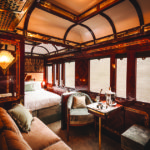
Belmond Venice Simplon-Orient-Express by WATG
- In the retail category, the shortlist includes Waterfrom Design’s ‘Molecure Pharmacy’ in Taiwan. The design is inspired by the original pharmaceutical process of extracting molecules from nature to create healing drugs. The metal, lightweight glass and transparent acrylics are criss-crossed, and straight lines are adopted to build the display racks; similar to the expansion of a molecule – with medicines placed on them, the display racks seem to disappear from the space, while the varied pharmaceutical packaging adds colour to the walls.
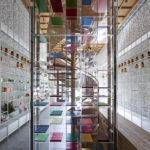
Molecure Pharmacy by Waterfrom Design – Taiwan



